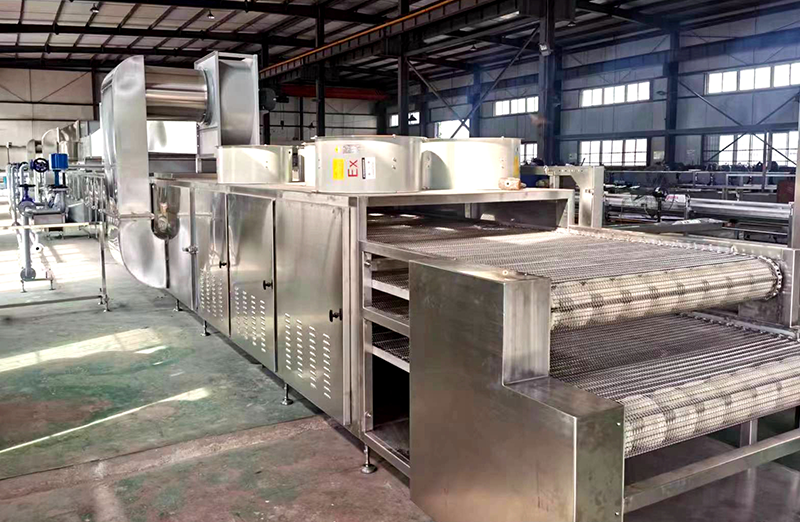Non-fried noodle production lines can contribute to environmental sustainability and waste reduction in several ways:
Waste Reduction: Waste reduction strategies encompass a holistic approach aimed at minimizing both raw material and packaging waste. Optimizing cutting and portioning techniques through advanced slicing technology and portion control systems minimizes raw material waste during production. Implementing lean manufacturing principles streamlines production processes, reducing inefficiencies and excess waste generation. Embracing circular economy principles involves redesigning packaging to maximize recyclability or compostability, thus minimizing packaging waste. Exploring innovative packaging solutions, such as biodegradable films or reusable containers, offers sustainable alternatives to traditional packaging materials. Collaboration with suppliers to optimize packaging design and materials ensures alignment with waste reduction objectives throughout the supply chain.
Packaging Innovation: Sustainable packaging innovation involves leveraging eco-friendly materials and designs to minimize environmental impact. Utilizing recycled content in packaging materials reduces reliance on virgin resources and promotes a circular economy. Designing packaging for efficient material usage and space optimization maximizes packaging efficiency while minimizing material waste. Exploring alternative packaging formats, such as flexible pouches or paper-based wraps, offers lightweight and eco-friendly alternatives to traditional packaging formats. Investing in research and development of bio-based packaging materials derived from renewable sources, such as plant-based plastics or mushroom packaging, demonstrates a commitment to sustainability and innovation.
Efficient Logistics: Efficient logistics management plays a crucial role in minimizing environmental impact throughout the distribution process. Optimizing transportation routes through route planning software and consolidation strategies reduces fuel consumption and greenhouse gas emissions. Utilizing fuel-efficient vehicles equipped with telematics systems allows for real-time monitoring of fuel efficiency and driver behavior, optimizing vehicle performance and reducing emissions. Implementing Just-In-Time inventory management practices minimizes excess inventory and transportation waste, streamlining logistics operations and reducing environmental footprint. Investing in alternative fuel vehicles, such as electric or hybrid vehicles, further reduces reliance on fossil fuels and mitigates air pollution associated with transportation activities.
Lifecycle Assessment: Conducting a comprehensive lifecycle assessment enables a thorough evaluation of the environmental impact of noodle production from cradle to grave. This involves assessing the environmental footprint of raw material extraction, processing, manufacturing, distribution, product use, and end-of-life disposal or recycling. Utilizing life cycle assessment software and methodologies facilitates the quantification of environmental impacts, such as greenhouse gas emissions, water usage, and resource depletion, across the entire product lifecycle. Identifying hotspots of environmental impact allows for targeted interventions to minimize environmental footprint, guiding decision-making and resource allocation towards more sustainable practices.
NON-FRIED HAND ARRANGED NOODLE PRODUCTION LINE

 2024.05.07
2024.05.07
 Industry News
Industry News
